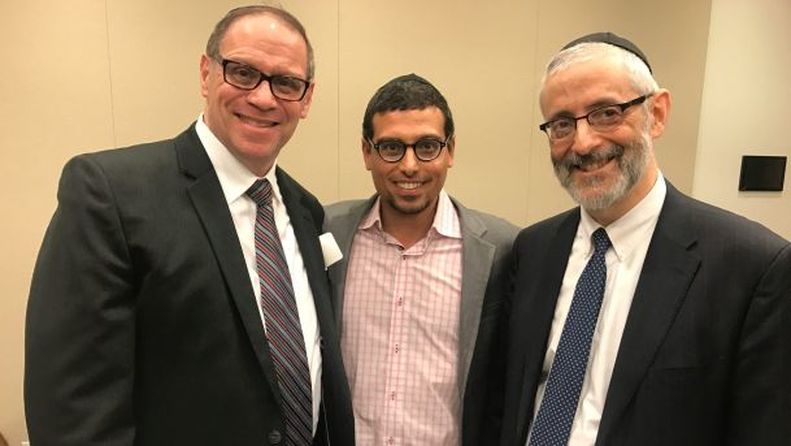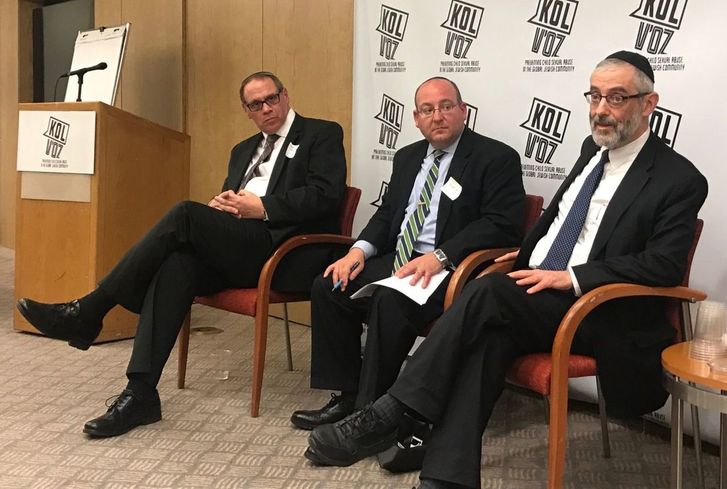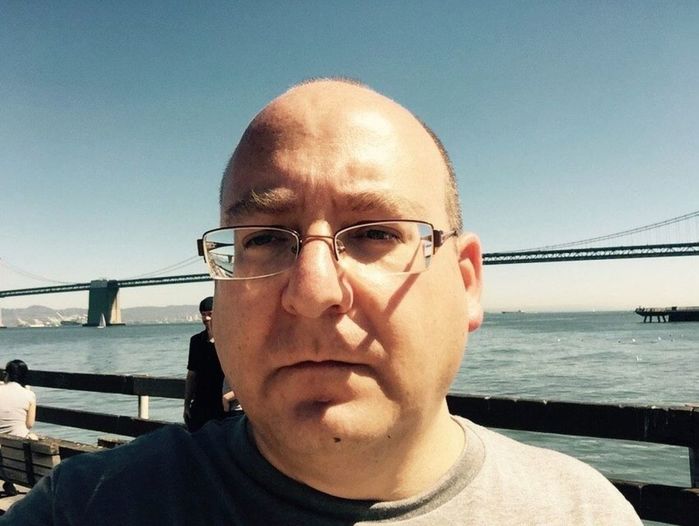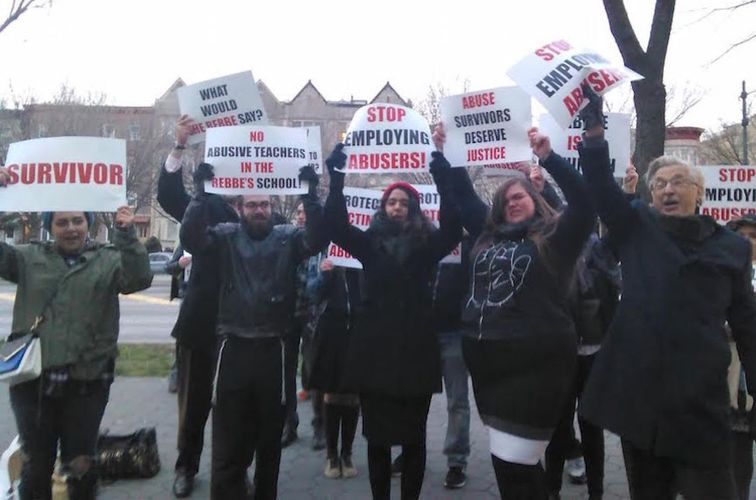American ultra-Orthodox are starting to talk about sexual abuse
Ha'aretz
Debra Nussbaum Cohen
1 February 2017
 RCA’s Rabbi Mark Dratch, left, Kol v’Oz’s Manny Waks and the Agudah’s Rabbi David Zwiebel, right (photo: Debra Nussbaum Cohen).
RCA’s Rabbi Mark Dratch, left, Kol v’Oz’s Manny Waks and the Agudah’s Rabbi David Zwiebel, right (photo: Debra Nussbaum Cohen).
As more alleged victims step forward, the Orthodox community grapples with the phenomenon while maintaining its insular traditions. Leading rabbis met in New York this week to broach this delicate issue.
NEW YORK – The Orthodox Jewish community is slow to change, even – perhaps especially – on difficult issues like child sexual abuse. But speakers at a gathering of leading Orthodox rabbis and others made clear that significant changes are underway at both institutional and cultural levels. For example, a joint project of the Orthodox Union and Rabbinical Council of America to create training programs for synagogue staff, in an effort to help prevent sexual abuse, is getting started.
The very fact that Rabbi David Zwiebel, executive vice president of Agudath Israel of America, spoke at the meeting also reflected a shift. While the topic has been addressed at recent Agudah conventions, this was the first time that Zwiebel addressed it outside of his own community, he told Haaretz.
It is a challenging subject for a community that prizes modesty, deference to rabbinic authority and believes that turning in a Jew to secular authorities is a violation of Jewish law, especially if there is suspicion but not certainty of sexual abuse. Yet “if you compare the landscape to just a few years ago there have been enormous changes” in the Haredi community, Zwiebel told the opening session, in a conference room rented from UJA-Federation of New York in midtown Manhattan.
The “Global Summit on Child Sexual Abuse in the Jewish Community” was put together by Manny Waks and his organization Kol v’Oz. Waks, who was sexually molested as a child in Melbourne, Australia’s Chabad community, started Kol v’Oz last year in Israel to deal with the issue.
The aim of the two-day gathering is to allow experts in childhood sexual abuse to network and share best practices, Waks told Haaretz. Ultimately, “the goal is a collaborative global coalition” to work on the issue. Two similar gatherings were convened in Israel in recent years, but this is believed to be the first time that such a meeting has brought together different segments of the Jewish community in the U.S.
The meeting included a hand-picked group of leaders of social service organizations that aid victims of sexual abuse, researchers and prominent rabbis from as near as Brooklyn and as far as Israel and Mexico. Also attending was the national director of the yeshiva day school movement Torah u’Mesorah, Rabbi Dovid Nojowitz.
“There has been marked change” in how the Orthodox community deals with sex abuse, said David Cheifetz, a victim of childhood molestation himself. Cheifetz, now a victims’ advocate, moderated a discussion between Zwiebel and Rabbi Mark Dratch, executive vice president of the Rabbinical Council of America. “This issue has come to the forefront because more people are speaking out [after having been abused],” Cheifetz told Haaretz.
Enough victims are coming forward now that they have reached a critical mass and can no longer be dismissed by Orthodox leaders as troubled, marginal people, he said. And a recent wave of suicides and drug overdoses among Haredi young adults, along with a significant exodus of people out of religious observance are also shocking ultra-Orthodox leaders into taking seriously the relationship between those things and childhood sexual molestation.
Two years ago Zvi Gluck started “Amudim,” which provides counseling and other services to victims and families of those affected by sexual abuse, among others. “It represents a tangible effort by the Haredi community that these people need help, and can’t just sha shtil [remain silent],” Gluck said at the meeting.
The fact that last Saturday night he trained a room full of Haredi rabbis how to deal with child sexual abuse shows that “a lot has changed.”
NEW YORK – The Orthodox Jewish community is slow to change, even – perhaps especially – on difficult issues like child sexual abuse. But speakers at a gathering of leading Orthodox rabbis and others made clear that significant changes are underway at both institutional and cultural levels. For example, a joint project of the Orthodox Union and Rabbinical Council of America to create training programs for synagogue staff, in an effort to help prevent sexual abuse, is getting started.
The very fact that Rabbi David Zwiebel, executive vice president of Agudath Israel of America, spoke at the meeting also reflected a shift. While the topic has been addressed at recent Agudah conventions, this was the first time that Zwiebel addressed it outside of his own community, he told Haaretz.
It is a challenging subject for a community that prizes modesty, deference to rabbinic authority and believes that turning in a Jew to secular authorities is a violation of Jewish law, especially if there is suspicion but not certainty of sexual abuse. Yet “if you compare the landscape to just a few years ago there have been enormous changes” in the Haredi community, Zwiebel told the opening session, in a conference room rented from UJA-Federation of New York in midtown Manhattan.
The “Global Summit on Child Sexual Abuse in the Jewish Community” was put together by Manny Waks and his organization Kol v’Oz. Waks, who was sexually molested as a child in Melbourne, Australia’s Chabad community, started Kol v’Oz last year in Israel to deal with the issue.
The aim of the two-day gathering is to allow experts in childhood sexual abuse to network and share best practices, Waks told Haaretz. Ultimately, “the goal is a collaborative global coalition” to work on the issue. Two similar gatherings were convened in Israel in recent years, but this is believed to be the first time that such a meeting has brought together different segments of the Jewish community in the U.S.
The meeting included a hand-picked group of leaders of social service organizations that aid victims of sexual abuse, researchers and prominent rabbis from as near as Brooklyn and as far as Israel and Mexico. Also attending was the national director of the yeshiva day school movement Torah u’Mesorah, Rabbi Dovid Nojowitz.
“There has been marked change” in how the Orthodox community deals with sex abuse, said David Cheifetz, a victim of childhood molestation himself. Cheifetz, now a victims’ advocate, moderated a discussion between Zwiebel and Rabbi Mark Dratch, executive vice president of the Rabbinical Council of America. “This issue has come to the forefront because more people are speaking out [after having been abused],” Cheifetz told Haaretz.
Enough victims are coming forward now that they have reached a critical mass and can no longer be dismissed by Orthodox leaders as troubled, marginal people, he said. And a recent wave of suicides and drug overdoses among Haredi young adults, along with a significant exodus of people out of religious observance are also shocking ultra-Orthodox leaders into taking seriously the relationship between those things and childhood sexual molestation.
Two years ago Zvi Gluck started “Amudim,” which provides counseling and other services to victims and families of those affected by sexual abuse, among others. “It represents a tangible effort by the Haredi community that these people need help, and can’t just sha shtil [remain silent],” Gluck said at the meeting.
The fact that last Saturday night he trained a room full of Haredi rabbis how to deal with child sexual abuse shows that “a lot has changed.”
 L-R Rabbi Mark Dratch, David Cheifetz, Rabbi David Zwiebel, speaking about child sexual abuse in Orthodox communities (photo: Debra Nussbaum Cohen).
L-R Rabbi Mark Dratch, David Cheifetz, Rabbi David Zwiebel, speaking about child sexual abuse in Orthodox communities (photo: Debra Nussbaum Cohen).
Still, said some at the meeting, the needs of victims still are not being taken seriously enough by Orthodox institutions.
Rabbi Yosef Blau, the spiritual guide to rabbinical students at Yeshiva University and a widely respected authority on this issue in the Orthodox community, was one. “Frankly, I haven’t seen as much pragmatic progress as theoretical progress,” he said. “Is there willingness of leadership in the Orthodox community to follow through, to give support to that child [who is a victim of sexual abuse],” he asked. “Are the Agudah and the RCA ready to go into the community and say publicly ‘we back this person going to the police?’”
Several developments have coalesced to push Orthodox organizations forward, say experts. Social media has had much to do with spreading information about abusers and connecting victims. The Catholic Church sexual abuse crisis burst onto the American scene in the early 2000s, as did several high-profile cases in the Orthodox community, beginning with that of Baruch Lanner, who then worked as director of regions for the modern Orthodox youth movement NCSY.
Emotions ran high, particularly during discussion of the Statute of Limitations. In New York State, which is home to the overwhelming majority of American Haredim, the law is that a victim must initiate a case against an alleged perpetrator within five years after his 18th birthday. Experts say that foreclosing the possibility of civil or criminal prosecution when a victim is only in his early 20s is unrealistic, because it often takes most many more years before they are ready to openly discuss their abuse.
The Agudah, with the Catholic Church, have to date blocked change to the law.
 David Cheifetz (photo: Mi Li)
David Cheifetz (photo: Mi Li)
A bill introduced in various forms in the New York State Assembly for more than a decade would eliminate the civil Statute of Limitations, meaning a victim could sue his abuser for monetary damages in a civil court at any time. That bill would also open a year-long window during which older victims could retroactively sue those responsible.
That is what the Agudah opposes, Zwiebel said, though it supports extending the criminal Statute of Limitations indefinitely and raising the victim’s age for the civil lawsuit limit. Jewish law has no Statute of Limitations in criminal cases, pointed out YU’s Blau.
Zwiebel said, of the Agudah’s resistance to a change in the law, “schools are the crown jewels of our community. For them to have retrospective liability for things done decades ago under a different administration would cause damage to those jewels,” by potentially bankrupting them.
Waks responded, in a voice full with emotion, “it often comes across in the Haredi world that they care much more about the institutions than the victims. Are they really much more precious than children’s lives?”
Barry Singer was also in the room. The Manhattan bookseller was one of 34 plaintiffs who in 2013 sued Yeshiva University for the sexual abuse they said they suffered while students in YU-run high schools. The lawsuit was dismissed because none of the men had filed it while within the Statute of Limitations period. During the hearings and appeals, “we were treated very badly by YU,” said Singer, though the university did not challenge the veracity of any of the plaintiffs’ allegations.
 Orthodox activists protesting outside a Brooklyn yeshiva, asking institutions to do more to report and investigate allegations of child sexual and physical abuse (photo: Chaim Levin/JTA).
Orthodox activists protesting outside a Brooklyn yeshiva, asking institutions to do more to report and investigate allegations of child sexual and physical abuse (photo: Chaim Levin/JTA).
Addressing Zwiebel and Dratch, he said: “You say, much to my dismay, that the institution is more important than the child … Do you really think you can move forward without finding some way to address those of us still living in the nightmares that began in high school?”
When Cheifetz was a 13-year-old camper at an Orthodox overnight camp in Pennsylvania’s Pocono Mountains, a 28-year-old staff member plied him with beer and then tongue-kissed and sexually fondled him. Cheifetz confided in a bunkmate, who told camp officials. They called Cheifetz to the office and forced him to confront the staff member. Then they packed him onto a Greyhound Bus back to New York City, telling his parents to pick him up at Port Authority.
It is difficult today to imagine such allegations being handled the same way, though social repercussions like being kicked out of yeshiva or being unable to make marriage matches for adult children continue to dissuade members of Orthodox, especially Haredi, communities from openly pursuing claims of sexual abuse.
“Progress is incremental,” Cheifetz, now 51, told Haaretz. “It is slow. But it’s real.”
Originally published at Ha'aretz.